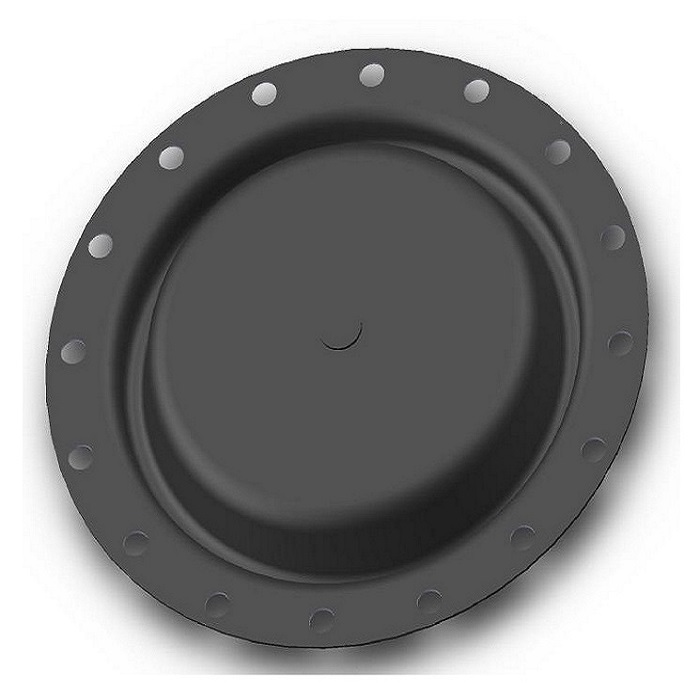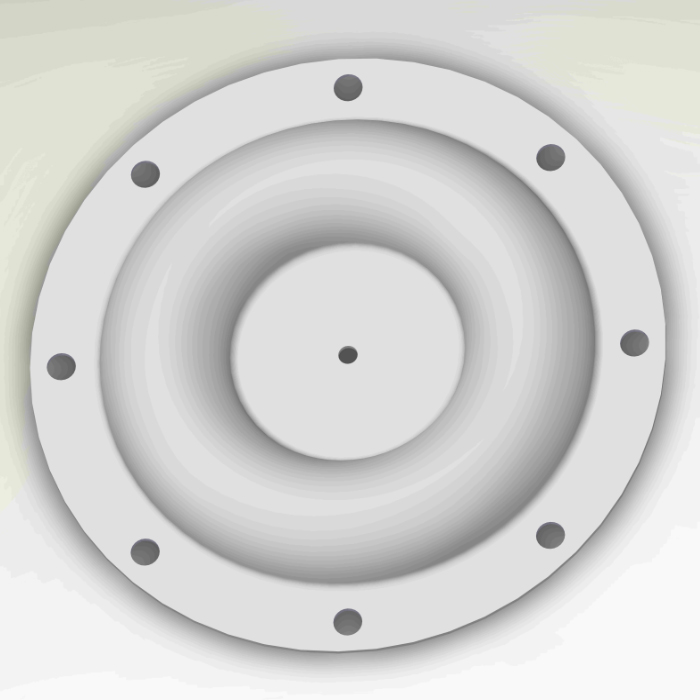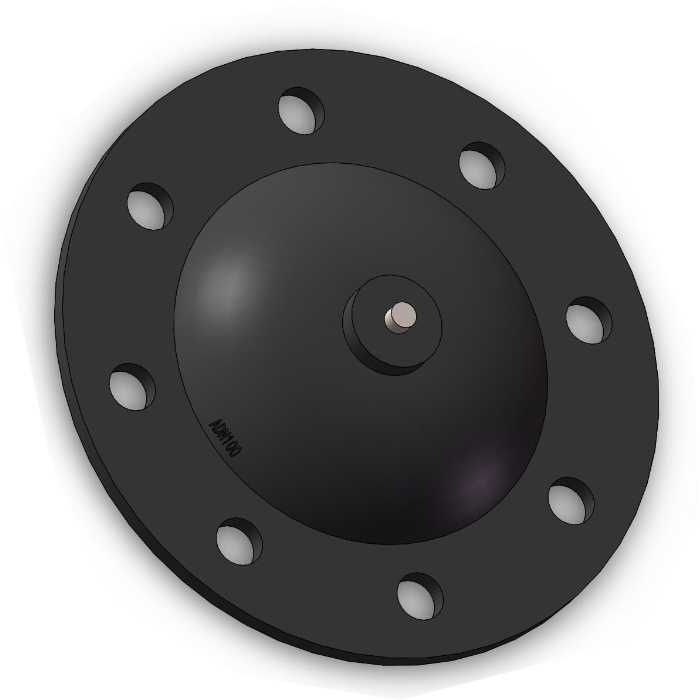GENERAL SEALTECH LIMITED was established in 2007, specializing in the production of high-precision silicone rubber sealing products. The main products include Teflon / PTFE Diaphragm,Turbo Actuator Waste-gate Diaphragms,Diaphragm Valve pump Diaphragms,Rolling diaphragm,LPG CNG Diaphragm,Solenoid Pulse Valve Diaphragms, etc. Widely used in industries such as chemical industry,Battery industry,Food processing industry,automotive industry.
We firmly believe that only excellent quality can win the trust of customers in the fierce market. Our products have been exported to regions such as Africa,Europe,America.And it has been loved by local customers.
| Product Name | custom ptfe diaphragms |
| Materials | Silicone,FVMQ,FKM,NBR,NR,etc |
| Brand Name | GENERAL SEALTECH |
| Place of Origin | Hangzhou,Zhejiang,China |
| Product Type | Diaphragm |
| Colors | blue,Recommended black |
| Sample | Available |
| Hardness | 20~90 Shore A diaphragm for regulator |
| Packing | PE Bag+Carton |
| OEM/ODM | Yes |
| Export region | Europe,Oceania,Asia… |
| Export Country | USA,France,Italy,Australia,Canada,Wallis and Futuna,Dominica,Croatia…etc |
| Properties | Fire Resistance,Steam Resistance,Oil Resistance…etc |
| Size | DN max = 2000mm, all other smaller sizes will per customer demands |
| Warranty | 1 Year |
| Function | Seal for Machine,Automotive,etc |
| After-sale Service | Online technical support |
| Certification | EN681-1,CCS,PAHS,RoHS,National Sanitary Certificate,etc |
| Packaging | carton or according to requirements of the customers |
| Lead time (days) | 7-15 (To be negotiated) |
| Supply Ability | 50000-200000 Piece/Pieces per Month |
Please note: The above table data is for reference only. For specific information, please contact us.
The design principle of a custom ptfe diaphragms is to use the failure strength and failure mode of materials or structures to set personalized control strategies for a certain heat or mass transfer medium, or for the occurrence of certain flow or diffusion effects, in order to achieve specific functions or protocols.
If the medium used is corrosive, corrosion-resistant diaphragm materials should be selected;
Necessary protective measures should be taken to minimize damage to objects that come into contact with the already installed diaphragm.
Provide customized services exclusive to customers, and customize various diaphragm products according to their needs to meet the needs of different industries.
custom ptfe diaphragms—FAQs Guide
2.Can custom ptfe diaphragms be used in contact with food or pharmaceutical products, and what certifications are required for compliance with industry standards?
3.Can custom ptfe diaphragms be used in both dynamic and static sealing applications, and what are the differences in their design and performance?
4.As a custom ptfe diaphragms manufacturer,What kind of payment do you accept?
5.As a custom ptfe diaphragms manufacturer,Can you make custom parts based on my sample?
6.Are there specialized custom ptfe diaphragms for high-pressure applications, and what features make them suitable for these conditions?
7.How do custom ptfe diaphragms perform in applications where flexibility and rapid response to pressure changes are crucial?
8.What types of sealing mechanisms are commonly used with custom ptfe diaphragms, such as clamped, bolted, or adhesive seals?
9.Can custom ptfe diaphragms be used in air-operated or pneumatic systems, and how do they contribute to system functionality?
10.Are there custom ptfe diaphragms designed for use in critical industries such as aerospace and healthcare, and what unique properties do they possess?
11.As a custom ptfe diaphragms manufacturer,Can you supply different color materials?
12.What role do custom ptfe diaphragms play in controlling fluid flow and preventing leaks in pumps and valves?
13.What mechanical and industrial applications can diaphragms be used in?
14.Are custom ptfe diaphragms available in different shapes and sizes to suit specific applications?
15.Are custom ptfe diaphragms used in safety relief valves and pressure relief devices to prevent overpressure situations?
1.How does the thickness of a custom ptfe diaphragms affect its flexibility and pressure resistance?
The thicker the diaphragm, the less flexible it will be and the more pressure it will be able to resist. This is because thicker diaphragms are more rigid and can withstand higher pressures without deforming. Thinner diaphragms are more flexible and can deform more easily under pressure, but they are also less resistant to pressure.
2.Can custom ptfe diaphragms be used in contact with food or pharmaceutical products, and what certifications are required for compliance with industry standards?
Yes, diaphragms can be used in contact with food or pharmaceutical products. Depending on the application, the diaphragm must meet certain industry standards and certifications. For food contact applications, the diaphragm must meet the requirements of the US Food and Drug Administration (FDA) and the European Union (EU) Regulation 10/2011. For pharmaceutical applications, the diaphragm must meet the requirements of the US Pharmacopeia (USP) Class VI and the European Pharmacopoeia (EP).
3.Can custom ptfe diaphragms be used in both dynamic and static sealing applications, and what are the differences in their design and performance?
Yes, diaphragms can be used in both dynamic and static sealing applications. The main difference between the two is in the design and performance.
Dynamic sealing applications require a diaphragm that is designed to withstand the constant movement and pressure of the application. This type of diaphragm is usually made of a flexible material such as rubber or silicone, and is designed to flex and move with the application.
Static sealing applications require a diaphragm that is designed to remain in a fixed position and provide a tight seal. This type of diaphragm is usually made of a rigid material such as metal or plastic, and is designed to remain in a fixed position and provide a tight seal.
4.As a custom ptfe diaphragms manufacturer,What kind of payment do you accept?
Trade assurance, T/T, L/C, Weston Union are all accepted.

5.As a custom ptfe diaphragms manufacturer,Can you make custom parts based on my sample?
Yes, you can send the sample to us by express and we will evaluate the sample, scan the features and draft 3D drawing for production.
6.Are there specialized custom ptfe diaphragms for high-pressure applications, and what features make them suitable for these conditions?
Yes, there are specialized diaphragms for high-pressure applications. These diaphragms are designed to withstand higher pressures and temperatures than standard diaphragms. They are typically made from reinforced elastomers or metal materials such as stainless steel or Hastelloy. These materials are chosen for their strength and durability, as well as their ability to resist corrosion and wear. Additionally, these diaphragms are designed with thicker walls and reinforced edges to provide additional strength and stability.
7.How do custom ptfe diaphragms perform in applications where flexibility and rapid response to pressure changes are crucial?
Diaphragms are ideal for applications where flexibility and rapid response to pressure changes are crucial. They are designed to flex and move in response to pressure changes, allowing them to quickly adjust to changing conditions. This makes them ideal for use in applications such as pumps, valves, and other pressure-sensitive systems. Additionally, diaphragms are often used in applications where a tight seal is required, such as in fuel tanks and hydraulic systems.
8.What types of sealing mechanisms are commonly used with custom ptfe diaphragms, such as clamped, bolted, or adhesive seals?
In general, custom ptfe diaphragms will use these sealing mechanisms:
1. Clamped Seals: Clamped seals are the most common type of diaphragm seal. They are typically used in applications where the pressure is relatively low and the temperature is not too extreme. Clamped seals are easy to install and provide a reliable seal.
2. Bolted Seals: Bolted seals are used in applications where the pressure is higher and the temperature is more extreme. They are more difficult to install than clamped seals, but provide a more reliable seal.
3. Adhesive Seals: Adhesive seals are used in applications where the pressure is low and the temperature is not too extreme. They are easy to install and provide a reliable seal. However, they are not as reliable as clamped or bolted seals.

9.Can custom ptfe diaphragms be used in air-operated or pneumatic systems, and how do they contribute to system functionality?
Yes, diaphragms can be used in air-operated or pneumatic systems. Diaphragms are flexible membranes that are used to separate two different areas of a system. They are used to control the flow of air or other gases in a system. They can be used to regulate the pressure of the system, to control the flow of air, and to act as a check valve. Diaphragms can also be used to dampen vibrations and reduce noise.
10.Are there custom ptfe diaphragms designed for use in critical industries such as aerospace and healthcare, and what unique properties do they possess?
Yes, there are diaphragms designed for use in critical industries such as aerospace and healthcare. These diaphragms are typically made from high-performance materials such as PTFE, FKM, and EPDM, which offer superior chemical and temperature resistance, as well as excellent durability and strength. Additionally, these diaphragms are designed to meet the stringent requirements of these industries, such as tight tolerances, high-pressure ratings, and low-leakage rates.
11.As a custom ptfe diaphragms manufacturer,Can you supply different color materials?
Yes, we can produce custom molded rubber and silicone rubber products in different colors, the color code will be required in case of an order.
12.What role do custom ptfe diaphragms play in controlling fluid flow and preventing leaks in pumps and valves?
Diaphragms are flexible membranes that are used to control fluid flow and prevent leaks in pumps and valves. They are typically made of rubber or plastic and are designed to flex and move in response to pressure changes. When pressure is applied to one side of the diaphragm, it flexes and creates a seal that prevents fluid from leaking out. This seal is maintained until the pressure is released, allowing the diaphragm to return to its original shape and allowing the fluid to flow freely. Diaphragms are used in a variety of applications, including pumps, valves, and other fluid control systems.

13.What mechanical and industrial applications can diaphragms be used in?
Diaphragms can be applied in multiple industries. GENERAL SEALTECH will introduce these to you:
1. Pumps: Diaphragms are used in pumps to separate the pump chamber from the motor, allowing the pump to move fluid without the motor becoming contaminated.
2. Valves: Diaphragms are used in valves to control the flow of liquids and gases.
3. Compressors: Diaphragms are used in compressors to create a seal between the compressor and the cylinder, allowing the compressor to compress the air or gas.
4. Actuators: Diaphragms are used in actuators to convert energy into motion.
5. Filters: Diaphragms are used in filters to separate particles from liquids and gases.
6. Seals: Diaphragms are used in seals to create a tight seal between two surfaces.
7. Pressure Vessels: Diaphragms are used in pressure vessels to contain and control the pressure of a gas or liquid.
8. Heat Exchangers: Diaphragms are used in heat exchangers to separate two fluids while allowing heat to transfer between them.
14.Are custom ptfe diaphragms available in different shapes and sizes to suit specific applications?
Yes, diaphragms are available in different shapes and sizes to suit specific applications. The shape and size of the diaphragm will depend on the application and the type of material used. For example, a diaphragm made of rubber may be used for a water pump, while a diaphragm made of metal may be used for a pressure regulator.
15.Are custom ptfe diaphragms used in safety relief valves and pressure relief devices to prevent overpressure situations?
Yes, diaphragms are commonly used in safety relief valves and pressure relief devices to prevent overpressure situations. The diaphragm is a flexible membrane that is designed to open when the pressure inside the device reaches a certain level, allowing the pressure to be released.
Tags: keihin carb accelerator pump diaphragm,ford 351 fuel pump diaphragm kit,aquarium air pump diaphragm,bmw 760li high pressure fuel pump diaphragm,rubber pump diaphragm

